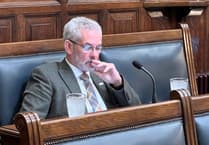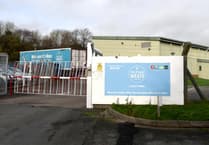Treasury Minister Dr Alex Allinson MHK announced the first personal income tax rises in well over a decade as he unveiled his second Budget in Tynwald this morning (Tuesday).
Sustainable finances and long-term stability were the key themes of this year’s Budget.
But it’s the increase in income tax rise - the first since 2010-11 – that will grab the headlines.
The higher rate of personal income tax will rise from 20% to 22% in April, with the additional income — forecast to be worth up to £20m — being ring-fenced for the island’s healthcare services.
A forthcoming Tax Strategy to be presented for discussion at next month’s Tynwald sitting proposes the introduction of a standalone annual NHS levy, which would aim to replace the tax increase.
Dr Allinson said: ‘Although our income tax receipts have been strong and are currently forecast to be in excess of £320m, there still remains a gap in healthcare funding which must be addressed now and for the future.‘
After exploring my options for a balanced budget, I have made the decision to increase the higher rate of income tax from 20% to 22% and ring-fence this extra income to support our NHS.’
MORE ON THE 2024 BUDGET:
He told Tynwald he intended to lead a debate on the Tax Strategy next month and work with members to investigate bringing forward the new ‘NHS levy’ which he said would lead to a ‘fairer way that all those in our community could help fund the healthcare system they rely on’.
‘It is my ambition to introduce the levy from the 2025-26 income tax year,’ he added.
The income tax personal allowance remains at £14,500 for individuals and £29,000 for jointly assessed couples, and the 10% band stays fixed at £6,500.
Company tax on some banks and large retailers will be increased, from 10% to 15%, raising income to further support and prioritise the delivery of essential services for our community.
A Petroleum Extraction Tax will also be brought forward, with the government taxing income from petroleum operations in the Island, including its territorial sea, at a 20% rate from April.
Dr Allinson committed to invest in healthcare, education and frontline services, while laying out a robust five-year strategy and future proposals to strengthen the Island’s fiscal resilience.
Acknowledging the challenges posed by a three-year period of global economic uncertainty, Dr Allinson said: ‘This island’s ongoing ability to thrive in a tough economic climate and to have sufficient strength to respond to shocks is of vital long-term importance and why now perhaps more than ever it is essential that we have a financially sustainable budget for our future.
’Government revenue spending for 2024-25 is budgeted at £1.3bn, representing £16,343 for every person in the island.
Health and education were at the centre of the day’s announcements with an additional combined total of more than £59m being allocated to their respective departmental budgets.
The Department of Health and Social Care will be provided with a significant increase of £41.2m, while the Department of Education, Sport and Culture’s funding will rise by more than £18m.
All departments will see increases to their budgets which have been rebased to take account of inflationary pressures and pay-related costs — Infrastructure will receive an additional £7.2m, Cabinet Office £4.6m, Home Affairs £4.2m, Treasury £3.3m, Enterprise £1.3m and Environment, Food and Agriculture £1.3m.
Most benefits will rise by 6.7% or 5.7% in line with either the UK or Isle of Man CPI rate at September 2023.
Maternity, paternity and adoption allowances will each increase by 15%, building on last year’s 16.8% rise.
A boost for families will see the child benefit rate for a second child and subsequent children being increased to the same level as that received for the first child.
Including a 5.7% inflationary uplift, this measure is forecast to cost £2.36m and will help around 3,000 families.Pensioners will continue to benefit from the triple-lock arrangement, with the basic state retirement pension and Manx state pension seeing an uplift of 8.5%.
A capital programme commits more than £274.7m over the next five years to deliver approved central government schemes.
This includes £3.2m to support plans to replace Castle Rushen High School.
The Treasury Minister told members: ‘We are accelerating the design stages and appointing additional specialist advisers to lead on this major investment.’
Funding in this year’s programme also includes £10m for climate change mitigation and adaption projects, £1.5m to undertake work at Isle of Man Airport and an additional £600,000 for improvements to Ramsey Shipyard.
There’s £6.125m committed to highway improvements and refurbishment as part of a rolling scheme, with an additional £1.155m for structural maintenance, while £2.25m is allocated to heritage rail each year for the next five years.
Contingency funding of £350,000 is being made available to assist the regional swimming pools.
Dr Allinson announced a review of the National Insurance Fund, which is due to be exhausted by 2047-48 if no action is taken.
The five-year financial plan continues to rely on transfers from general reserves to bridge the gap between income and expenditure although withdrawals are planned to fall over successive years.
And this current year the drawdown reduced from the predicted £152.9m to £126.5m thanks to income tax receipts being £48m higher than forecast.
The 2024-25 Budget relies on the use of £98m of reserves to balance the books.




Comments
This article has no comments yet. Be the first to leave a comment.